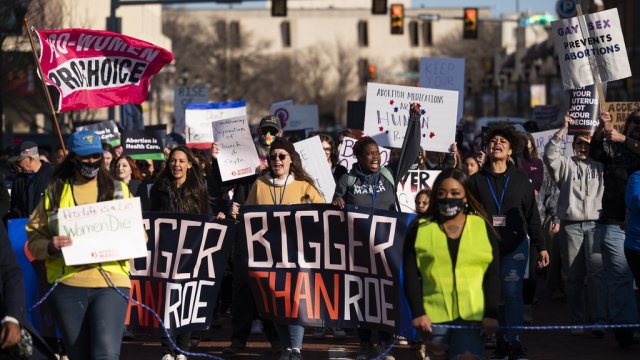During Tuesday's Supreme Court hearing involving the Food and Drug Administration's approval of a popular abortion drug, justices seemed skeptical about rolling back the agency's authority to approve such medication.
The legal challenge has put a question mark over the status over mifepristone, which in combination with a second drug, misoprostol, is the most common treatment option for medical abortions, according to the pro-abortion rights Guttmacher Institute. Mifepristone has been approved by the FDA for over 20 years.
The lawsuit was filed by three doctors and a group called the Alliance for Hippocratic Medicine incorporated in Amarillo, Texas, in 2022. They argued that they, as medical professionals, could be forced to violate their religious beliefs by conducting surgery if a woman suffering a complication of medical abortion went to their emergency room.
Justice Ketanji Brown Jackson challenged that argument.
"Do we have to also entertain your argument that no one else in the world can have this drug or no one else in America should have this drug in order to protect your clients," she asked.
Erin Hawley, who is representing the doctors, responded, "Your honor, it's not possible given the emergency nature of these situations."
Hawley is one of the lawyers who successfully argued to have Roe v. Wade overturned in the Dobbs case.
Another major question brought up during Tuesday's hearing was on what the ripple effect would be if mifepristone is curtailed and what effect that would have on other treatments.
"Rolling back FDA's changes would unnecessarily restrict access to mifepristone with no safety justification," U.S. Solicitor General Elizabeth Prelogar told the justices. "Some women could be forced to undergo more invasive surgical abortions. Others might not be able to access the drug at all and all of this would happen at the request of plaintiffs who have no certain injury of their own."
This is the most significant abortion-related case before the court since its conservative majority rolled back abortion rights protection in 2022 by overturning Roe v. Wade. But the issues in the case go beyond abortion, touching on the scope of a federal judge’s authority, said Eva Temkin, who heads the Paul Hastings law firms practice related to the Food and Drug Administration.
If upheld, it also could represent a significant expansion of the power of federal judges over decisions by the FDA and other regulatory agencies that judges are generally required to defer to over a wide variety of scientific questions about health and safety.
It also almost might not resolve the case.
“We've started in district court on a preliminary injunction, we've gone up to the Fifth Circuit, and now we're up in the Supreme Court," Temkin said. "And we've already done this ping pong with the stay motions and the emergency proceedings. And depending on what the Supreme Court says, we may just be kind of looping around back to the district court for further consideration."
SEE MORE: Medical board tries to clarify exceptions to Texas' ban on abortions
Where the case came from
The original order came in April 2023 from U.S. District Court Judge Matthew Kacsmaryk in Amarillo, Texas — an avowed opponent of abortion rights appointed to the bench by former President Donald Trump. He ordered the drug pulled from the market while the case proceeds.
That sweeping order, which held that the FDA had been wrong to approve the drug in 2000, was partially reversed in August 2023 by a three-judge panel of the U.S. Fifth Circuit Court of Appeals in New Orleans. They reinstated the FDA’s original 2000 drug approval under the brand name Mifeprex and 2019 approval of a generic version on procedural grounds.
That court, however, upheld the part of Kacsmaryk’s injunction which overrode 2016 and 2021 FDA actions that widened access to the drug and allowed it to be dispensed at pharmacies and to be prescribed via telemedicine virtual visits.
A decision is expected by mid-summer.
In the meantime, mifepristone remains available in states where its use in abortion is legal.
Trending stories at Scrippsnews.com



